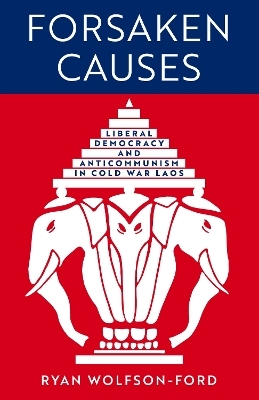
Forsaken Causes
Liberal Democracy and Anticommunism in Cold War Laos
Seiten
2024
University of Wisconsin Press (Verlag)
978-0-299-34860-1 (ISBN)
University of Wisconsin Press (Verlag)
978-0-299-34860-1 (ISBN)
- Lieferbar
- Versandkostenfrei
- Auch auf Rechnung
- Artikel merken
Offers the groundbreaking intellectual history of the Royal Lao Government (RLG) from 1945 to 1975. Ryan Wolfson-Ford’s account firmly centers the Lao people as not pawns of the superpowers but agents of their own history, with the Lao elite as the authors of the nation’s trajectory.
Postcolonial and post–World War II Southeast Asia churned with new political, social, and cultural realities and possibilities. Liberal democracies flourished briefly, only to be discarded in favor of dictatorships and other authoritarian regimes, as the disorder and slow response times inherent to democracy proved unsavory or unequal to the challenges of the Cold War. Uniquely, Laos maintained a stable democracy into the 1970s, but its history has often been flattened into the global tug-of-war between the superpowers.
Forsaken Causes offers the groundbreaking intellectual history of the Royal Lao Government (RLG) from 1945 to 1975. Ryan Wolfson-Ford’s account firmly centers the Lao people as not pawns of the superpowers but agents of their own history, with the Lao elite as the authors of the nation’s trajectory. The prevailing ideologies of liberal democracy and anticommunism were not imposed from the outside, as is usually assumed in Western accounts; rather, they were rooted in the specific culture of Laos, which prized its traditional monarchy, its Buddhist faith, and a powerful nationalistic concept of Lao race. Contrary to histories that dismiss the Lao elite as mere instruments of foreign powers, the RLG charted its own course during the Cold War, guided by complex motivations, rationales, and beliefs. By recentering the Lao in their own history, Wolfson-Ford restores our understanding of this robust, multiparty political system and enhances our understanding of postcolonial and Cold War Southeast Asia as a whole.
Postcolonial and post–World War II Southeast Asia churned with new political, social, and cultural realities and possibilities. Liberal democracies flourished briefly, only to be discarded in favor of dictatorships and other authoritarian regimes, as the disorder and slow response times inherent to democracy proved unsavory or unequal to the challenges of the Cold War. Uniquely, Laos maintained a stable democracy into the 1970s, but its history has often been flattened into the global tug-of-war between the superpowers.
Forsaken Causes offers the groundbreaking intellectual history of the Royal Lao Government (RLG) from 1945 to 1975. Ryan Wolfson-Ford’s account firmly centers the Lao people as not pawns of the superpowers but agents of their own history, with the Lao elite as the authors of the nation’s trajectory. The prevailing ideologies of liberal democracy and anticommunism were not imposed from the outside, as is usually assumed in Western accounts; rather, they were rooted in the specific culture of Laos, which prized its traditional monarchy, its Buddhist faith, and a powerful nationalistic concept of Lao race. Contrary to histories that dismiss the Lao elite as mere instruments of foreign powers, the RLG charted its own course during the Cold War, guided by complex motivations, rationales, and beliefs. By recentering the Lao in their own history, Wolfson-Ford restores our understanding of this robust, multiparty political system and enhances our understanding of postcolonial and Cold War Southeast Asia as a whole.
Ryan Wolfson-Ford is a Southeast Asia Reference Librarian at the Library of Congress.
List of Abbreviations
Introduction
1 Origins of Democracy
2 Democracy in Practice
3 Origins of Anticommunism
4 Universal Democracy
5 Anticommunism and Nationalism
6 Democracy and Dictatorship
7 Anticommunism and Neutralism
8 Return of Democracy
9 Death of Democracy
Conclusion: Specter of Democracy
Notes
Bibliography
Index
| Erscheinungsdatum | 05.07.2024 |
|---|---|
| Reihe/Serie | New Perspectives in SE Asian Studies |
| Verlagsort | Wisconsin |
| Sprache | englisch |
| Maße | 152 x 229 mm |
| Gewicht | 454 g |
| Themenwelt | Geschichte ► Allgemeine Geschichte ► Zeitgeschichte |
| Geisteswissenschaften ► Geschichte ► Regional- / Ländergeschichte | |
| Sozialwissenschaften ► Politik / Verwaltung ► Politische Systeme | |
| Sozialwissenschaften ► Politik / Verwaltung ► Politische Theorie | |
| ISBN-10 | 0-299-34860-1 / 0299348601 |
| ISBN-13 | 978-0-299-34860-1 / 9780299348601 |
| Zustand | Neuware |
| Haben Sie eine Frage zum Produkt? |
Mehr entdecken
aus dem Bereich
aus dem Bereich
Gewalt, Umwelt, Identität, Methode
Buch | Softcover (2024)
Spector Books OHG (Verlag)
CHF 49,95
wie Freud im Kollektiv verschwand
Buch | Hardcover (2024)
Klett-Cotta (Verlag)
CHF 34,95


